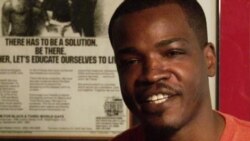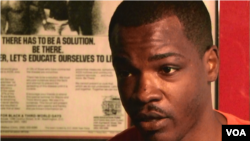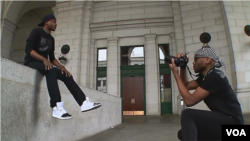Christian Paige-Bass is positive in attitude and in HIV status. An activist in Washington, D.C.’s gay African-American community, he believes in confronting the HIV/AIDS crisis and related stigma head on, with solid information.
The District’s latest health report gives him more reason to be positive.
Surveillance data show “progress in combatting HIV,” says the report, released earlier this summer. They show the number of newly reported HIV cases decreased by nearly half, to 718, while more people sought treatment. As of 2011, 2.4 percent or just over 15,000 of the District’s almost 618,000 residents were living with HIV. The number of HIV-related deaths dropped from 425 in 2007 to 251 four years later.
But stigma and fear still keep many from getting the health services they need, says Paige-Bass says.
Uncomfortable in hometown
He knows what it means to be isolated and ashamed.
Now 33, Paige-Bass grew up in a small, conservative North Carolina town in which intolerance for homosexuality was all too common, he says.
“The word ‘gay’ was never used. The word mainly was 'faggot,' ” he says of the names he was called. “… I don't like that town."
In 2001, both Paige-Bass and his mother, an intravenous drug user, were diagnosed as HIV positive.
“They told me I had two years to live,” he says. At first he wallowed in misery and fear, he says. But he shifted gears.
“You can’t just let it take you down. It was more so the fact that my mother was [HIV] positive as well, and I just had to do something to make her feel better.”
When she died in 2006 of complications from AIDS, Paige-Bass again was gripped with fear.
He looked on the dresser and saw she’d begun filling her pillbox with the next week’s doses of antiretroviral medicine. Suspicion took hold as he looked at the pills, Paige-Bass says. “I remember thinking, 'This is gonna be the death of me.' And from that day forward I didn’t want to take any more pills."
A sense of belonging
Needing a change of scenery, he decided to visit some friends in Washington.
"I came to D.C. and I loved it,” he says. “I’ve seen all the gay people and the freedom they had. The things I could do. And I just ... I wanted to stay."
A change of scenery also changed his views about treatment. He went to Whitman-Walker Health, a D.C. community health center specializing in LGBT and HIV care.
At first, Paige-Bass "was really resistant to the idea of starting treatment for HIV,” says Justin Goforth, a nurse practitioner and the clinic’s communications director.
“I think that he had a lot of really emotional baggage around his mother dying of HIV, and the huge number of treatment and pills, really, that she was taking when she died. … And now he’s become an advocate for people being on treatment."
Paige-Bass says a positive attitude makes a difference in delivering that message.
"If you take your medication [you will] still be healthy and still look good, and still be nice,” he says. “You can live long. You don’t really see AIDS patients [suffering] like you used to in the '80s.”
He’s a firm believer in educating people about HIV/AIDS to allay their fears. “Use the word ‘HIV,’ people will stay,” he says. “Use the word 'I’m positive' and nobody’s going to move. But [if] you use the word ‘AIDS,’ it's like you're turning the lights on and the roaches are running."
He works at 'clubbing'
Paige-Bass’ push for testing and treatment has made him a regular on Washington’s gay club scene.
Going to clubs is a form of work, says Paige-Bass, who makes a living as a model, musician, makeup artist and self-described “media maven.”
He gives them his health spiel and his contact information. “Some of them are there for a moment and then they’re gone, and they’ll text me when they need me,” he says. “But you know we’ll keep in contact."
Paige-Bass finds his own supporters at Bethel Christian Church, a Pentecostal church in southeast Washington that describes itself on Facebook as “Christian progressive.”
"We don’t want to call ourselves a gay church. We call ourselves radically inclusive,” Paige-Bass says. “We have transgender [members] and we have straights or heterosexuals as well who attend the church.”
There, he’s often at the microphone. "I really love to sing,” he says. “I think God gifted me with a talent to being able to use my voice to sing."
And then, recharged, he uses it to carry his message of health advocacy and inclusion.
VOA’s Carol Guensburg contributed to this report.







